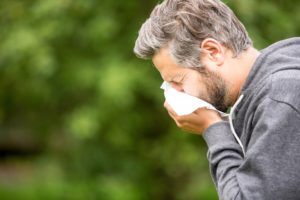Overview
Allergies are a constant nuisance for those who suffer from them. It can have a significant impact on your quality of life and are associated with other medical conditions. Severe allergic reactions (anaphylaxis) can even be life-threatening. Unfortunately, many people confuse myth with reality in the way they view and treat allergies.
Some of these myths are harmless, but others can actually cause harm by encouraging people to try out treatments that don’t work. Here are some of the biggest myths about allergies you’ll come across:
Myth: Allergies Are Psychosomatic.
Allergies are very real, however, emotional factors can make allergies better or worse. Emotional stress can precipitate allergic reactions, and relaxation techniques can moderate them. A person who is strongly allergic to roses, for example, may react to the sight of a plastic rose, demonstrating the involvement of the mind and the brain.
Myth: Eating a Little Bit of a Food Won’t Hurt.
Giving a food-allergic person a small amount of the food they’re allergic to will not necessarily reduce the allergy and can be extremely dangerous, even deadly.
Myth: Probiotics Can Help Fight Allergies.
Probiotics are often used to treat a variety of symptoms and conditions, mainly in our digestive tracts. But some believe the regular consumption of them helps fend off allergy attacks, too. As beneficial as they are for our guts, there’s just not enough research to recommend them for allergy management.
Myth: Allergy Shots Only Work in Children.
Experts say allergy shots, or immunotherapy, are beneficial at any age and can offer significant relief. The shots contain just enough of an allergen to stimulate the immune system, but not enough to cause an allergic reaction.
With each session, doctors increase the amount of allergen in the shot. The idea is for a person to build up a tolerance to the specific allergen over time.
Myth: Allergy Shots are Useful Only for Severe Cases.
Getting a series of injections, called immunotherapy, helps about 80 percent of patients with allergic rhinitis. It builds up your tolerance to offending substances by exposing you to small amounts of them. The main downside is that the injections are time-consuming; most patients will need shots every week for the first six months, then monthly for about three years.
Myth: Patients On Allergy Shots Receive Them for the Rest of Their Life.
The average patient remains on allergy shots for only a 5-6 years period.
Myth: Consuming Local Honey Treats Pollen Allergies.
This myth comes from the idea that, since bees carry pollen, some of that pollen would get into the honey they make. It’s a good thought, but again, most of the pollen that ends up in local honey is not the same as the pollen that causes the majority of seasonal allergies. Researchers at the University of Connecticut Health Center put the idea to the test and found no significant difference among those who ate local honey, mass-produced honey, or an imitation-honey syrup.
Myth: Adults Can’t Develop Allergies.
A reaction to pollen or other triggers can happen at almost any age. Allergies do have a genetic component, but your environment can determine when those genes might be expressed. “We’re seeing a lot of patients developing hay fever for the first time in their 20s and 30s,” says Neal Jain, M.D., a board certified allergist in Gilbert, AZ and a fellow of the American Academy of Allergy, Asthma, and Immunology.
Myth: Short-Haired Pets Don’t Cause Allergies.
Both short and long pet hair can set you off. Also, keep in mind the real culprit is a protein produced by glands in your pet’s skin or saliva. Since cats do more licking, they cause more symptoms. During cold weather, keeping your pet shampooed will help.
Myth: Moving to the Southwestern States Will Cure Allergies.
or allergy sufferers, there is simply no safe haven. While desert regions have no maple trees or ragweed, they do have plenty of other plants that produce pollen, including sagebrush, cottonwood, ash, and olive trees. Relocating to such a region may offer relief for a few months, but a fresh crop of allergies to local plants is likely to develop before long.
Bottomline
There are many myths about allergies that are incorrect and even dangerous or life-threatening. Your best bet is to work with a certified allergist to optimize your course of action.
Dr. Amy Schiffman, a board certified allergist in Boca Raton, Florida, treats a wide range of allergy and immunology related disorders including environmental, food, and drug allergies. Get in touch with her today to discuss about allergy treatment and prevention.

